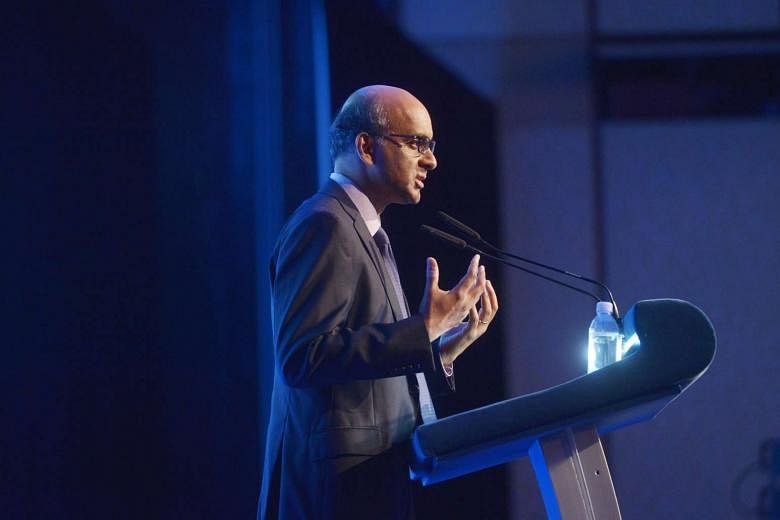HONG KONG (BLOOMBERG) - The world economy needs something like a modern-day Plaza Accord to safeguard growth against currency market volatility, according to Deputy Prime Minister Tharman Shanmugaratnam.
The remarks Mr Tharman, who is also a former finance minister, come a week before Group of 20 officials gather in Washington to discuss the state of the world economy. Similar calls ahead of a G-20 finance ministers meeting in Shanghai six weeks ago were rebuffed by top officials who said the world economy isn't on the brink of crisis.
"We can't keep hoping that the U.S. Fed will postpone normalization of interest rates," Shanmugaratnam said on Thursday in Mumbai. "But we have to have some way of preventing that eventuality from also meaning significant instability in exchange rates and capital flows at a time when Japan, Europe and China are facing very different economic conditions."
While central banks including China, Indonesia, the euro area and Japan have pumped more stimulus into their economies since the Shanghai gathering, the moves haven't been part of a coordinated push. Mr Shanmugaratnam said an agreement in the spirit of the Plaza or Louvre accords would help boost growth for emerging markets as the world economy gets stuck in "second gear".
"Imperfect, doesn't guarantee stability, but it is better than leaving it entirely to the short termism of the markets and the self-reinforcing expectations of the market," Mr Shanmugaratnam said. Coordination on exchange rates would include intervention operations and involve "an understanding as to the zone in which we would like the major exchange rates to be," he said.
Mr Shanmugaratnam made the comments while sharing a stage with Indian central bank Governor Raghuram Rajan, an outspoken critic of unconventional monetary policy. In an interview on Wednesday, Mr Rajan called the global economy "unstable" and worried that a reluctance to return to normalcy would lead to "QE infinity".
While Mr Rajan didn't comment directly on Mr Shanmugaratnam's proposal on Thursday, he said they agreed on many issues.
"The question we have to ask ourselves is are we moving in the right direction, is there a better way, could we at least try and make sure that we don't impose costs on each other as we try to come out of our own difficulties?" Mr Rajan told the conference. "Certainly there's a lot of room for discussion."

